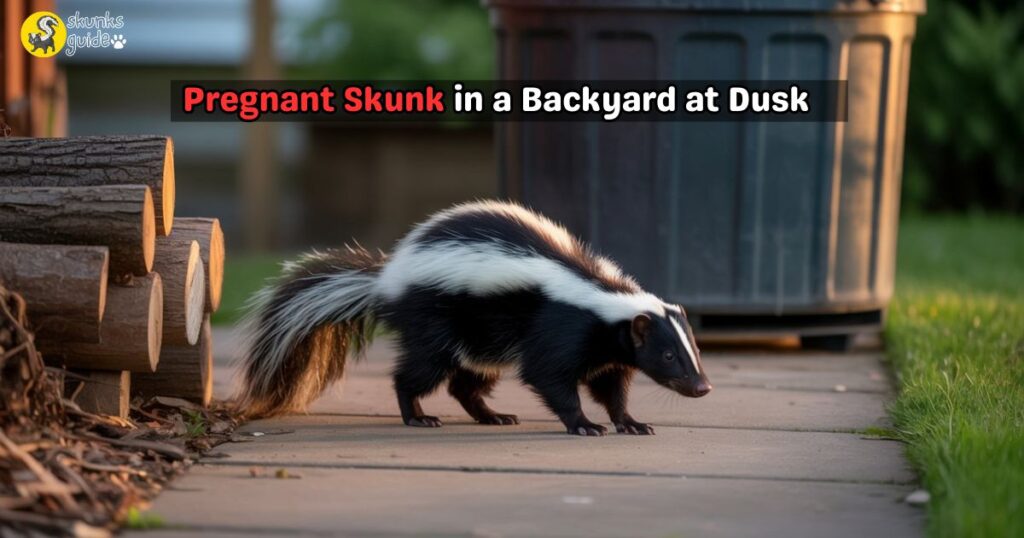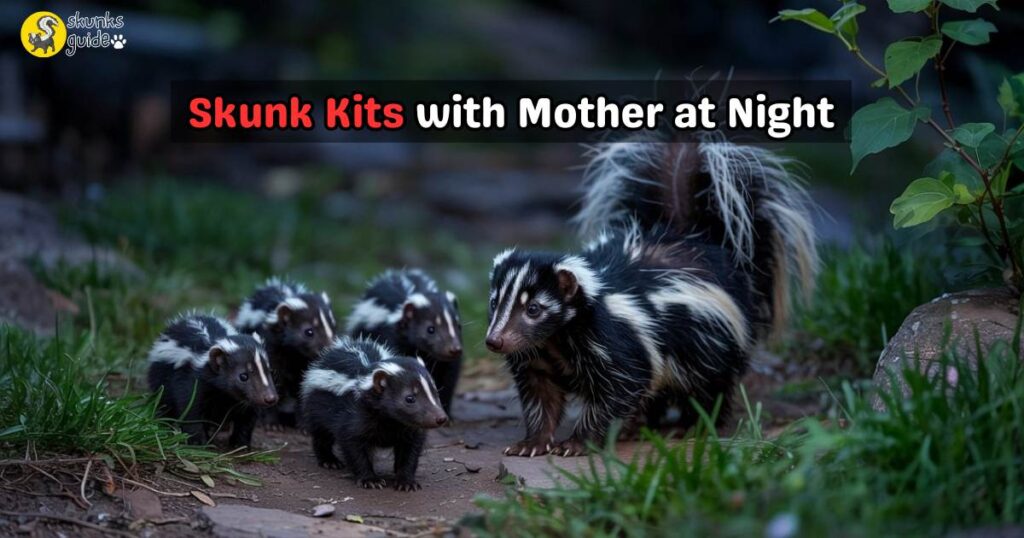Pregnant Skunk Behavior Guide: Mating, Gestation & Babies
Have you recently spotted a skunk waddling through your yard—during the day no less? That could be a pregnant mama on a mission. Understanding pregnant skunk behavior is essential for homeowners, gardeners, and pet owners alike.
I’m James Don, an animal researcher who’s spent years observing wildlife across different parts of the world—from hot deserts to forested mountains. I got a pretty good idea of what a skunk mama-to-be is up to—and how you can live alongside her without trouble.
Whether you’re curious about pregnant skunk behavior at night, wondering when skunks give birth, or questioning odd myths like “do skunks lay eggs in the ground?” — this article answers all those questions and more.
At a Glance: What Pregnant Skunks Do

| Behavior | Description |
|---|---|
| Increased Daytime Activity | Searching for safe, quiet den sites—unusual for nocturnal animals |
| Nesting Instinct | Collecting leaves, grass, and debris to line a birthing den |
| Defensive Reactions | More likely to stomp, hiss, or spray to protect themselves and unborn kits |
| Continued Night Foraging | Still hunts for insects and grubs at night, just slower and more cautious |
Skunk Mating Behavior: The Start of the Cycle
Skunks begin their family planning in late winter:
- Mating Season: Late February through March
- Male Behavior: Males mate with several females, marking territory with musk and competing with vocalizations and even sprays
- Female Behavior: Females choose when to accept a mate; if not interested, they release their own musk to drive males away
- Copulation: Brief and followed by the male moving on in search of other partners
Fun Fact: Female skunks are the ultimate gatekeepers. If she’s not interested, her message is loud (and smelly) and clear!
How Long Are Skunks Pregnant?
Skunks don’t rush nature.
- Gestation Period: Typically 62–77 days (about 2 to 2.5 months)
- Litter Size: Usually 4–7 kits, but some mamas have up to 10
- Birthing Season: Most kits are born between April and May, though younger females may birth later
Pregnant Skunk Behavior at Night
Although pregnancy shifts some patterns, skunks remain mostly nocturnal.
At night, expect the following behaviors:
- Waddling Forage Trips: She’ll be out hunting for protein-rich food like bugs, eggs, and even fallen birdseed
- Heightened Caution: She’s more skittish and defensive, so keep pets indoors
- Nest Preparation: If she hasn’t already settled in, she’ll keep searching and collecting bedding materials under cover of darkness
Pro Tip: If you notice signs of digging near your shed or deck at night, she might be scoping it out as a maternity suite.
Daytime Surprises: Pregnant Skunks Are Out and About
Normally nocturnal, pregnant skunks sometimes emerge during the day—especially in the final weeks before birth.
Here’s why:
- Nest Hunting: She’s urgently trying to find the perfect birthing site
- Disturbances: If her current den gets disrupted, she’ll relocate
- Hunger: Pregnancy is hard work—sometimes daytime snacks are needed
This is normal, but it’s also your chance to keep distance and avoid triggering her defensive instincts.
Where Do Skunks Give Birth?
Expecting mothers look for quiet, secure, and dark places to raise their kits.
Popular maternity dens include:
- Under Sheds, Porches, or Decks
- Abandoned Animal Burrows or Hollow Logs
- Thick Brush, Woodpiles, or Rock Crevices
She’ll line the den with leaves and soft grass, creating a cozy space to keep the newborns warm. While skunks may share winter dens, pregnant females usually go solo for birthing.
Kit Development: From Helpless to Independent

At birth, kits are tiny, fragile, and dependent.
- Newborns: Born blind, deaf, and lightly furred
- 3 Weeks: Eyes open and senses begin developing
- 6–7 Weeks: Kits begin weaning and exploring with mom at night
- 2 Months: They resemble mini adults and stay with mom until late summer
- Autumn: Kits disperse and establish their own territories
Note: The father is not involved. In fact, adult males may harm the young if they come near.
Myth Buster: Do Skunks Lay Eggs in the Ground?
Let’s put this one to bed: Skunks do not lay eggs.
They are mammals that give live birth. The myth probably comes from their habit of raiding bird nests for eggs—one of their favorite meals.
Living with Pregnant Skunks: Dos & Don’ts
If you find a pregnant skunk nearby, coexistence is possible—and often preferable to disturbing her.
Do:
- Observe from a distance using binoculars or cameras
- Keep pets indoors, especially at night
- Seal off denning sites after she and the kits have moved on
Don’t:
- Try to trap or relocate her while pregnant
- Corner her or make loud noises nearby
- Leave pet food or open trash outside overnight
Friendly Tip: Most skunks leave on their own once the kits grow up in late summer.
Quick Reference Table: Skunk Pregnancy Facts
| Topic | Answer |
|---|---|
| Pregnant skunk behavior at night | Still nocturnal, moves slowly, more cautious |
| Striped skunk gestation period | ~62–77 days |
| Do skunks lay eggs in the ground | No, they give live birth |
| Skunk mating behavior | Happens Feb–Mar, includes scent marking and vocal courtship |
| How long are skunks pregnant | Around 2 to 2.5 months |
| What time of year do skunks have babies | Spring—mostly April through May |
| When do skunks have babies | Typically late spring after mating season |
| Best places for nesting | Under decks, in burrows, brush piles, woodpiles |
Final Thoughts from a Skunk Care Pro
With five years of experience caring for these unique and intelligent animals, I know that understanding their pregnancy behaviors helps avoid unnecessary conflict. Whether you’re a skunk enthusiast or just trying to keep your yard skunk-free, knowledge is the best defense (and deodorizer).
For more guides on skunk behavior, safety, and care—explore the rest of my blog at SkunksGuide.com. Because the best way to deal with a skunk… is to understand her first.







